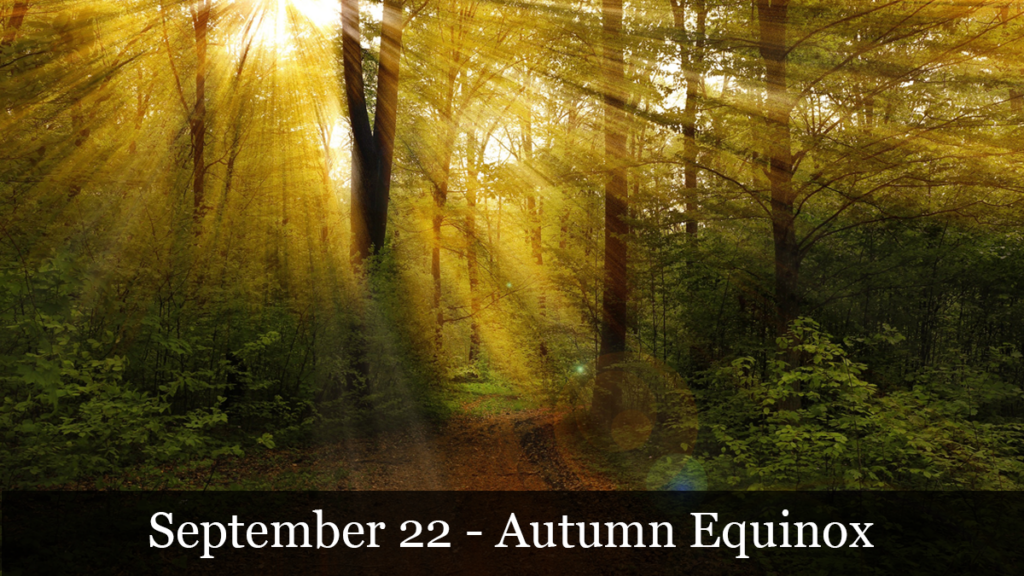
In 2001, September 22 is Autumn Equinox or Autumn Solstice.
There are two equinoxes — one is in September, and one in March. An equinox is when the times of night and day are about equal. After the Autumn Equinox, the days begin to get shorter, and after the Spring Equinox, the days begin to get longer. The actual dates of the Equinoxes vary a bit from year-to-year.
The word Equinox is of Latin origin, and it is derived from the words The word is derived from the Latin from aequus (equal) and nox ( night).
Even during the Pagan time, the people noted that that the changes in the lengths of night and day, and they celebrated at the times of the Equinoxes.
“Archaeologists believe a number of prehistoric sites were used by ancient peoples to track the position of the sun and predict equinoxes and solstices. Some of these sites include Stonehenge and Newgrange in the UK and the Majorville Medicine Wheel in Alberta, Canada.
Fall Equinox Customs And Rituals
“Greek Mythology: To the ancient Greeks, the September equinox marks the return of the goddess Persephone to the darkness of the underworld, where she is reunited with her husband Hades.
“Chinese Harvest Moon Festival: The full moon that falls closest to the autumnal equinox is sometimes called the Harvest Moon. The Chinese began celebrating the fall harvest at the Harvest Moon centuries ago, during the Shang dynasty. Ancient Chinese celebrated the successful harvest of rice and wheat and made offerings to the moon.”
Scientists have researched the properties of night and day now, but imagine how very fascinated that the ancients must have been by the sun and the moon, both of which came and went for varying amounts of darkness and light. Especially the Moon, probably because of it position in the more mysterious night sky, has fascinated storytellers for centuries.

Gerald McDermott recorded the African Anansi Stoy, which tells how the Moon came into being.
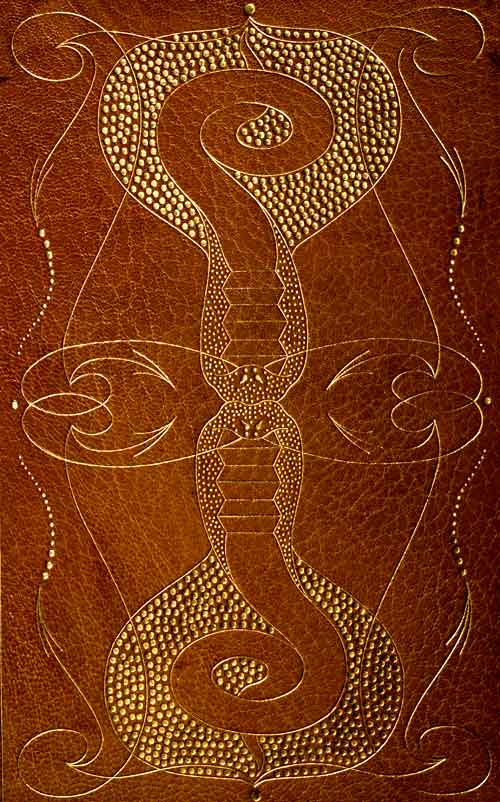

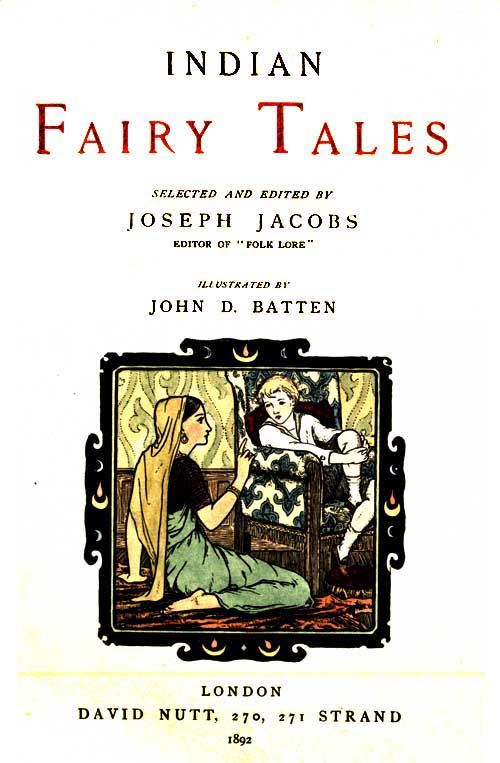
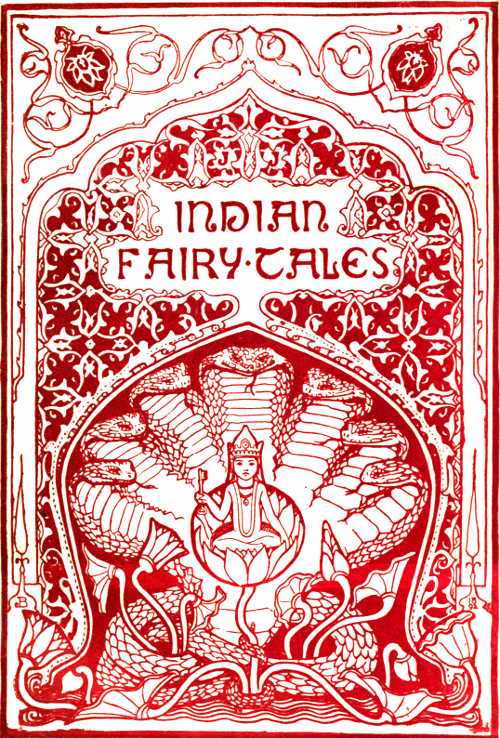
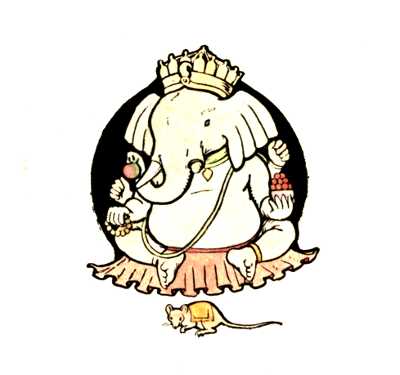
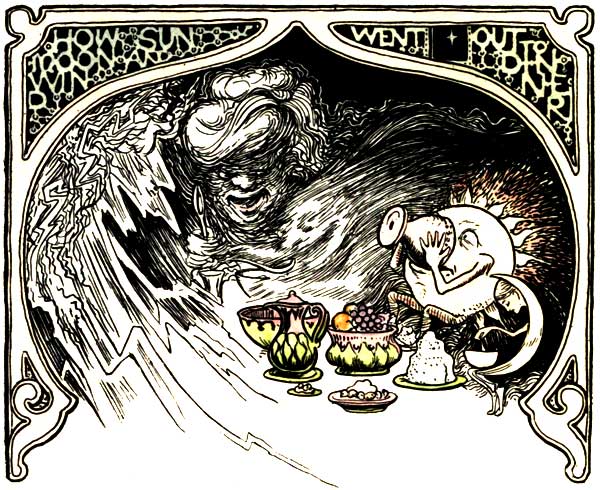
How Sun, Moon, and Wind went out to Dinner
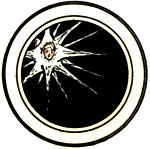 ne day Sun, Moon, and Wind went out to dine with their uncle and aunts Thunder and Lightning. Their mother (one of the most distant Stars you see far up in the sky) waited alone for her children’s return.
ne day Sun, Moon, and Wind went out to dine with their uncle and aunts Thunder and Lightning. Their mother (one of the most distant Stars you see far up in the sky) waited alone for her children’s return.Now both Sun and Wind were greedy and selfish. They enjoyed the great feast that had been prepared for them, without a thought of saving any of it to take home to their[219] mother—but the gentle Moon did not forget her. Of every dainty dish that was brought round, she placed a small portion under one of her beautiful long finger-nails, that Star might also have a share in the treat.
On their return, their mother, who had kept watch for them all night long with her little bright eye, said, “Well, children, what have you brought home for me?” Then Sun (who was eldest) said, “I have brought nothing home for you. I went out to enjoy myself with my friends—not to fetch a dinner for my mother!” And Wind said, “Neither have I brought anything home for you, mother. You could hardly expect me to bring a collection of good things for you, when I merely went out for my own pleasure.” But Moon said, “Mother, fetch a plate, see what I have brought you.” And shaking her hands she showered down such a choice dinner as never was seen before.
Then Star turned to Sun and spoke thus, “Because you went out to amuse yourself with your friends, and feasted and enjoyed yourself, without any thought of your mother at home—you shall be cursed. Henceforth, your rays shall ever be hot and scorching, and shall burn all that they touch. And men shall hate you, and cover their heads when you appear.”
(And that is why the Sun is so hot to this day.)
Then she turned to Wind and said, “You also who forgot your mother in the midst of your selfish pleasures—hear your doom. You shall always blow in the hot dry weather, and shall parch and shrivel all living things. And men shall detest and avoid you from this very time.”[220]
(And that is why the Wind in the hot weather is still so disagreeable.)
But to Moon she said, “Daughter, because you remembered your mother, and kept for her a share in your own enjoyment, from henceforth you shall be ever cool, and calm, and bright. No noxious glare shall accompany your pure rays, and men shall always call you ‘blessed.'”
(And that is why the moon’s light is so soft, and cool, and beautiful even to this day.)
\
James Mooney collected the stories of the old Cherokee people. Following are some he those tales that centered around the night sky:
7. THE JOURNEY TO THE SUNRISE
A long time ago several young men made up their minds to find the place where the Sun lives and see what the Sun is like. They got [256]ready their bows and arrows, their parched corn and extra moccasins, and started out toward the east. At first they met tribes they knew, then they came to tribes they had only heard about, and at last to others of which they had never heard.
There was a tribe of root eaters and another of acorn eaters, with great piles of acorn shells near their houses. In one tribe they found a sick man dying, and were told it was the custom there when a man died to bury his wife in the same grave with him. They waited until he was dead, when they saw his friends lower the body into a great pit, so deep and dark that from the top they could not see the bottom. Then a rope was tied around the woman’s body, together with a bundle of pine knots, a lighted pine knot was put into her hand, and she was lowered into the pit to die there in the darkness after the last pine knot was burned.
The young men traveled on until they came at last to the sunrise place where the sky reaches down to the ground. They found that the sky was an arch or vault of solid rock hung above the earth and was always swinging up and down, so that when it went up there was an open place like a door between the sky and ground, and when it swung back the door was shut. The Sun came out of this door from the east and climbed along on the inside of the arch. It had a human figure, but was too bright for them to see clearly and too hot to come very near. They waited until the Sun had come out and then tried to get through while the door was still open, but just as the first one was in the doorway the rock came down and crushed him. The other six were afraid to try it, and as they were now at the end of the world they turned around and started back again, but they had traveled so far that they were old men when they reached home.
8. THE MOON AND THE THUNDERS.
The Sun was a young woman and lived in the East, while her brother, the Moon, lived in the West. The girl had a lover who used to come every month in the dark of the moon to court her. He would come at night, and leave before daylight, and although she talked with him she could not see his face in the dark, and he would not tell her his name, until she was wondering all the time who it could be. At last she hit upon a plan to find out, so the next time he came, as they were sitting together in the dark of the âsĭ, she slyly dipped her hand into the cinders and ashes of the fireplace and rubbed it over his face, saying, “Your face is cold; you must have suffered from the wind,” and pretending to be very sorry for him, but he did not know that she had ashes on her hand. After a while he left her and went away again.
The next night when the Moon came up in the sky his face was covered with spots, and then his sister knew he was the one who had been [257]coming to see her. He was so much ashamed to have her know it that he kept as far away as he could at the other end of the sky all the night. Ever since he tries to keep a long way behind the Sun, and when he does sometimes have to come near her in the west he makes himself as thin as a ribbon so that he can hardly be seen.
Some old people say that the moon is a ball which was thrown up against the sky in a game a long time ago. They say that two towns were playing against each other, but one of them had the best runners and had almost won the game, when the leader of the other side picked up the ball with his hand—a thing that is not allowed in the game—and tried to throw it to the goal, but it struck against the solid sky vault and was fastened there, to remind players never to cheat. When the moon looks small and pale it is because some one has handled the ball unfairly, and for this reason they formerly played only at the time of a full moon.
When the sun or moon is eclipsed it is because a great frog up in the sky is trying to swallow it. Everybody knows this, even the Creeks and the other tribes, and in the olden times, eighty or a hundred years ago, before the great medicine men were all dead, whenever they saw the sun grow dark the people would come together and fire guns and beat the drum, and in a little while this would frighten off the great frog and the sun would be all right again.
The common people call both Sun and Moon Nûñdă, one being “Nûñdă that dwells in the day” and the other “Nûñdă that dwells in the night,” but the priests call the Sun Su′tălidihĭ′, “Six-killer,” and the Moon Ge′ʻyăgu′ga, though nobody knows now what this word means, or why they use these names. Sometimes people ask the Moon not to let it rain or snow.
The great Thunder and his sons, the two Thunder boys, live far in the west above the sky vault. The lightning and the rainbow are their beautiful dress. The priests pray to the Thunder and call him the Red Man, because that is the brightest color of his dress. There are other Thunders that live lower down, in the cliffs and mountains, and under waterfalls, and travel on invisible bridges from one high peak to another where they have their town houses. The great Thunders above the sky are kind and helpful when we pray to them, but these others are always plotting mischief. One must not point at the rainbow, or one’s finger will swell at the lower joint.
9. WHAT THE STARS ARE LIKE
There are different opinions about the stars. Some say they are balls of light, others say they are human, but most people say they are living creatures covered with luminous fur or feathers.
One night a hunting party camping in the mountains noticed two lights like large stars moving along the top of a distant ridge. They [258]wondered and watched until the light disappeared on the other side. The next night, and the next, they saw the lights again moving along the ridge, and after talking over the matter decided to go on the morrow and try to learn the cause. In the morning they started out and went until they came to the ridge, where, after searching some time, they found two strange creatures about so large (making a circle with outstretched arms), with round bodies covered with fine fur or downy feathers, from which small heads stuck out like the heads of terrapins. As the breeze played upon these feathers showers of sparks flew out.
The hunters carried the strange creatures back to the camp, intending to take them home to the settlements on their return. They kept them several days and noticed that every night they would grow bright and shine like great stars, although by day they were only balls of gray fur, except when the wind stirred and made the sparks fly out. They kept very quiet, and no one thought of their trying to escape, when, on the seventh night, they suddenly rose from the ground like balls of fire and were soon above the tops of the trees. Higher and higher they went, while the wondering hunters watched, until at last they were only two bright points of light in the dark sky, and then the hunters knew that they were stars.
10. ORIGIN OF THE PLEIADES AND THE PINE
Long ago, when the world was new, there were seven boys who used to spend all their time down by the townhouse playing the gatayû′stĭ game, rolling a stone wheel along the ground and sliding a curved stick after it to strike it. Their mothers scolded, but it did no good, so one day they collected some gatayû′stĭ stones and boiled them in the pot with the corn for dinner. When the boys came home hungry their mothers dipped out the stones and said, “Since you like the gatayû′stĭ better than the cornfield, take the stones now for your dinner.”
The boys were very angry, and went down to the townhouse, saying, “As our mothers treat us this way, let us go where we shall never trouble them any more.” They began a dance—some say it was the Feather dance—and went round and round the townhouse, praying to the spirits to help them. At last their mothers were afraid something was wrong and went out to look for them. They saw the boys still dancing around the townhouse, and as they watched they noticed that their feet were off the earth, and that with every round they rose higher and higher in the air. They ran to get their children, but it was too late, for they were already above the roof of the townhouse—all but one, whose mother managed to pull him down with the gatayû′stĭ pole, but he struck the ground with such force that he sank into it and the earth closed over him.
The other six circled higher and higher until they went up to the [259]sky, where we see them now as the Pleiades, which the Cherokee still call Ani′tsutsă (The Boys). The people grieved long after them, but the mother whose boy had gone into the ground came every morning and every evening to cry over the spot until the earth was damp with her tears. At last a little green shoot sprouted up and grew day by day until it became the tall tree that we call now the pine, and the pine is of the same nature as the stars and holds in itself the same bright light.
11. THE MILKY WAY
Some people in the south had a corn mill, in which they pounded the corn into meal, and several mornings when they came to fill it they noticed that some of the meal had been stolen during the night. They examined the ground and found the tracks of a dog, so the next night they watched, and when the dog came from the north and began to eat the meal out of the bowl they sprang out and whipped him. He ran off howling to his home in the north, with the meal dropping from his mouth as he ran, and leaving behind a white trail where now we see the Milky Way, which the Cherokee call to this day Giʻlĭ′-utsûñ′stănûñ′yĭ, “Where the dog ran.”

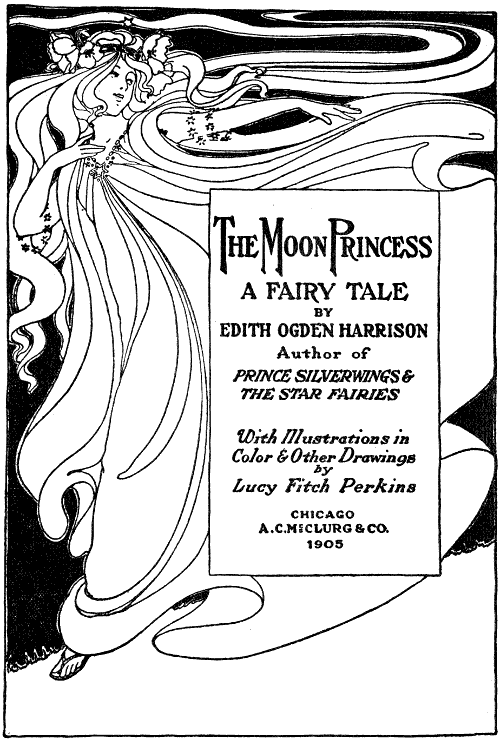
THE MOON PRINCESS
CHAPTER I
HOW THE MOON PRINCESS CAME TO THE EARTH

The heavens were a stainless blue, and the Moon shone out of them arrayed in silvery garments. One by one the sky’s matchless jewels, the stars, peeped out, studding that great ceiling with flashing diamond-points, until the whole dome was a glittering mass of blue and silver. The Ocean below seemed a big mirror, made to catch and reflect the bewildering beauty above, for, shimmering softly, he carried in his shining depths all those myriad lights.
Calm and majestic the Moon glided over her star-studded pathway; but, in spite of her glorious beauty and brilliancy, she was really sad and sick at heart. Ethelda, her best beloved, the youngest and dearest of her children, had just made a request the granting of which caused her that night bitterest sorrow.
There was an old custom among the Moon maidens that on her marriage each one of them might ask whatever she most desired, and the thing which she asked could not be denied her. Now, Ethelda of the starry eyes and the shining spun-gold hair had asked a fearful gift at her mother’s hands. She was betrothed to the Sun Prince Dorion, a handsome youth, strong of limb, and a goodly sight to look upon, and he had long loved her. He had seen this dainty maiden in all her varying moods, so he knew her well. Sometimes, with her Moon maidens merrily engaged at play, she romped happy as a child; or later, with the stately tread of a young princess, she came and went in her big white palace. She often wore a pale blue gown with silver trimmings, and a crown of flashing stars upon her head, and then it was the brilliantly beautiful girl looked the daughter of the skies.
Prince Dorion had watched the slender maiden until every strand of her glittering hair was dear to his heart. Later his father’s golden chariot brought him daily to her palace.
How Ethelda loved to watch him as he drove the fiery steeds with a master’s hands, guiding them surely and steadily to her palace gates! He was the finest of the Sun God’s sons, and Ethelda’s heart beat proudly as she looked upon her chosen one. The Moon Mother was happy too, in her daughter’s choice, and all would have been well in the wedding festivities save for Ethelda’s unheard-of request. How the Moon hated to grant it! But she had reasoned with Ethelda long and patiently without effect. For the wilful little Princess was bent upon this mad whim. “Alas! no good can come of it,” sighed the Moon heavily, and she gazed down sadly upon the Earth as she spoke. “No good can come of it,” she repeated. “What could have possessed the child to want it?”
For Ethelda had asked no less than this: to visit the Earth and spend her honeymoon there!
The young Sun Prince, though at first reluctant to take his beautiful bride upon such a wild trip, had finally yielded to her persuasions, and now, being won by her tender pleadings, was as anxious to go as she.
But the Moon Mother had no such faith in the foolish journey. Her mind misgave her, and as she swung around the great circle in celestial glory, her heart grew tremulous with fear for her daughter’s safety. The request must be granted: that she knew; but she was devoutly thankful for a wise law requiring a Moon maiden to revisit her own home yearly. At most, then, they could stay but a twelvemonth upon the Earth. Reason as she would, however, the Queen Mother’s heart was heavy, for with the daughter upon the Earth the mother’s happiness would be gone. But the maiden’s joy at the consent consoled her somewhat, and with an unselfish mother’s love the Queen determined to hide her own grief and make the wedding trip a brilliant and a joyous one.
Prince Dorion came with a great retinue of knights, all dressed in shining gold wrought in the Sun’s fiery furnace, and bringing wonderful jewels to his bride. The Moon Queen, not to be outdone in magnificence, showered silver in plenty upon them both, and bade one hundred of her loveliest maidens accompany the bridal pair upon their journey.
The wedding was so brilliant that the skies grew bright as day, and the splendor was reflected for many miles across the heavens. When the ceremony was over, the bride, in shining white and silver garments, came forth from the circle of her bridesmaids to bid her mother farewell.
Long-limbed and graceful was this daughter of the skies. Her finely cut features showed her high-bred race. Her blond hair hung in yellow masses to her knees, while her tender blue eyes, looking smilingly upon her mother’s face, were radiant with happiness. Gliding swiftly forward she reached the throne, and there, sinking on her knees, she begged her mother’s blessing.
Very tenderly the Queen watched her graceful child approach and kneel, and then leaning forward she raised her to her breast and showered caresses upon her.
“Ethelda, best beloved,” she began, “stay not beyond your allotted time upon the Earth. My heart misgives me when I think of your departure, and will be heavy until you return. But see, my daughter, I have provided for your safety as best I can, and you may come back to me whenever you choose.” So saying, she drew the bride gently toward the window of her white palace, and there, looking down, Ethelda saw a wonderful sight indeed. A beautiful shimmering ladder of moonlight stretched in infinite splendor down to the Earth. Whichever way she looked, the majestic sweep of that brilliant ladder was before her. It reached the Ocean, whose gigantic waves of foaming white rose to meet it, and it quivered in dazzling glory upon the green-clad forests of the land.
Ethelda was amazed and delighted at the wonderful sight, and throwing her arms around her mother’s neck, she poured forth her gratitude in loving words. “We will return soon, sweet mother,” she whispered tenderly; “those shining steps will lead us safely back to you.” Then, as her husband joined them, she stepped forward smilingly to greet him, saying she was ready.
One hundred of the Sun Prince’s knights, in trappings of gold made by the Sun himself, and with bright shades of crimson trimmings, joined them as she spoke. Ethelda’s maidens, in their glittering dresses of whitest silver, followed; and joining hands with the knights, began their magnificent wedding march to the Earth.
Never was there a more kingly sight. Preceding the bride and bridegroom, the gay cavalcade descended the glorious ladder of silver beams. Step by step they wandered down the moonglade toward the Earth, and the Moon, smiling lovingly at them, sighed again heavily as she spread her bright pathway of silver before them.
Now, the Earth knew of their coming, and she determined to give them a welcome befitting their high and mighty rank. She already owed a great debt to the Sun King, for it was his shining rays that warmed and nourished her and made her fruitful. Most of her splendid fertility was due to the warmth of the Sun. So she invited the whole world to meet the bridal party, giving a grand ball in their honor.
Her invitations were taken by the winds and swiftly carried to the four corners of the globe. Hundreds of noble personages were asked to meet the distinguished strangers, and all came to do them honor, bringing cordial greetings and invitations to visit the different parts of the world.
The night of the ball had come. The Earth, resplendent in jewels, awaited the arrival of her guests. The forest back of them was aglitter with lights, for all the glow-worms and fireflies had been summoned for the occasion, and for days they had been decorating the trees. An orchestra of birds sang delicious music, and overhead the sky was spangled with twinkling stars gazing in silent wonderment upon the Earth’s splendor.
By the side of the Earth Queen stood Prince Dorion. His suit of pure gold shone like the Sun himself, and next to him was his beautiful bride, the Moon Princess. She was dressed in white garments embroidered in silver, and she was certainly a charming vision. Her gleaming yellow hair was caught back from her forehead with a crown of flashing stars. Her clear blue eyes, with their deep sky tints, were dancing in lights as brilliant as her star crown itself.
First came the Earth’s eldest son, the Ocean King, to greet them. The Sea was a mass of fire with gleaming phosphorus, and King Ocean and his mermaid daughters seemed to be floating in red flames as they approached. The maidens’ long and wonderfully beautiful hair floated behind them as they swam, and they sang the most entrancing songs. They bore an invitation to Prince Dorion and his bride to visit them in their marine home. And this invitation was at once accepted by the strangers. Another invitation, accepted at once, came from Prince Dorion’s only sister, Princess Kuldah, who lived upon the Earth with her husband. Many more charming invitations were given them, but of course it was impossible to accept them all.
At last one distinguished-looking person strode forward, small of stature and ugly to look upon. His body was dwarfed, and he had a big hump on his back. His face was dark and glowering, and he wore a suit of yellow leaves. All the guests moved aside to let him pass, as though they feared him. He lived in the vast depths of the forest, amidst huge mountains; his daily work, with his thousands of imps, was to build those mountains big and high. Stone by stone he raised them, bleak and barren, to the clouds. He limped as he walked, and he glared angrily at the shrinking faces avoiding him; but he gave his invitation to the fair guests, as the others had done, and bowed low before them as he gave it.
An involuntary shudder ran through the lovely Princess as she heard his words, and she clung suddenly to her husband in terror, as the black dwarf’s eyes dwelt admiringly upon her. She felt a cold thrill of fear at his bold glance.
But Prince Dorion, reassuring her with a tender smile, turned to the ugly creature, and to the astonishment of the Earth Queen and her court, replied: “Sir Dwarf, we accept your invitation, and will gladly ride forth with you whenever our hostess wills. The Sun King, my father, and her Majesty the Queen of the Moon, have each sent the Earth a gift as a glad token of our visit here, and we must place our precious gold and silver deep within the bosom of your great mountains. There will it best thrive and grow, increasing and benefiting the world.”
The Moon Princess turned very pale when she heard her husband’s reply, but the black dwarf limped away with a gratified smile upon his ugly face.